
Magdalena Szuflita-Żurawska
Employment
- Lider Centrum Komeptencji Otwartej Nauki at Gdańsk University of Technology
- Kierownik Sekcji Inf. Nauk-Tech Biblioteki PG at Library
- Senior Librarian at Scientific And Technological Information Section
Research fields
Scientific posters
Magdalena Szuflita-Żurawska, Anna Wałek
Open Science Competence Center at the Gdansk University of Technology Library in numbers
International FAIR Convergence Symposium
November 27 - December 04, 2020
Summary: Bridge of Data project at Gdańsk University of Technology (GUT) was established to support researchers in their activities regarding different layers of Open Science. The project is unique in this part of Central and Eastern Europe. It involves three Pomeranian universities: Gdańsk University of Technology (leader), University of Gdańsk, and Gdańsk Medical University.
Open Science Competence Center is the separate contact point that offers help and supporting services for “sharing” research culture. The Center provides various training, consultancies, and other events promoting the idea of opening science and try to popularize its benefits such as broader collaboration, increasing usage and citations, faster impact, or greater public engagement.
Our Center in numbers (from the end of 2018)
- Number of workshops - 42
- Number of online training - 15
- Number of face to face consultations - 107
- Number of verified datasets - 420
- Data Management Plans from a wide range of scientific disciplines ( e.g. chemistry, engineering, electronics, architecture or economics) – about 200 from August 2019 to October 2020
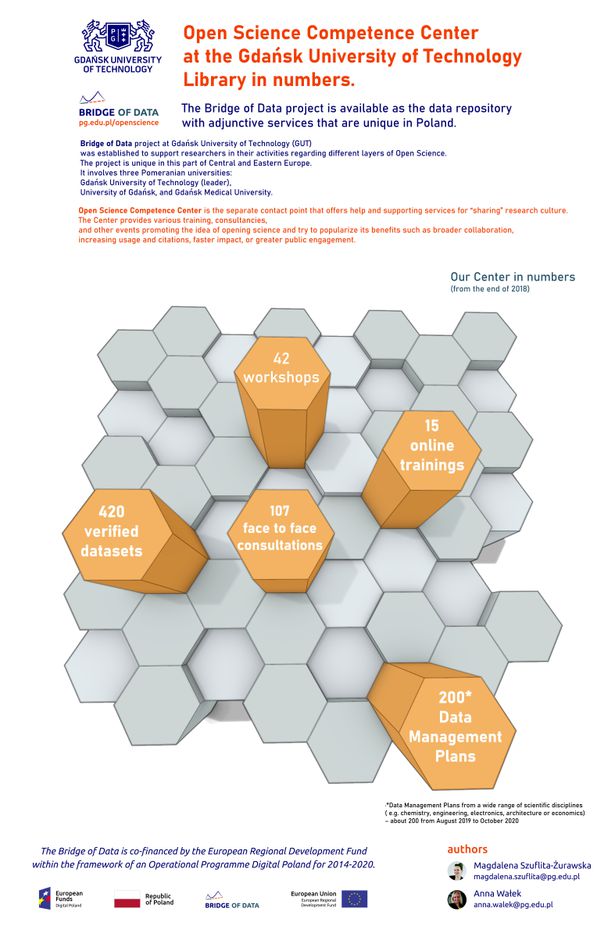
Anna Wałek, Magdalena Szuflita-Żurawska
Open Science Competency Center – towards engaging and supporting researchers in opening research data across disciplines
15th International Digital Curation Conference
February 17-20, 2020, Dublin
Summary: This poster aims to present the role of the Open Science Competence Center (OSCC) at Gdańsk University of Technology (GUT) in engaging and supporting academic scholars in opening their research data.
OSCC has been established under The Bridge of Data project (Multidisciplinary Open Transfer Knowledge System - stage II: Open Research Data: Digital Poland Project Centre) in response to filling the gap in the area of scholarly communication support at the scientific institutions.
Opening research data is one of the emerging trends for the researchers across the globe, however, it has to be stressed that the level of implementation and awareness of open research data varies between countries. Currently, in Poland, there is no national policy regarding Open Research Data, therefore National Science Centre who already signed Plan S, has set up the obligation to attached the short Data Management Plan to all grants’ applications starting from September 2019.
OSCC is a team of professionals who guide researchers through different aspects and stages of data management such as legal issues, DMP or data archiving.
The poster explains the workflow process of OSCC activities regarding differences in scientific disciplines represented at the GUT. Each discipline has its scholarly communication practices and should be treated individually concerning the maintaining regulations and procedures following the research data issues. Our poster shows examples of five disciplines (chemistry, civil engineering, economics and management, computer science and biology) in relations to the common problems occurred during preparing datasets for publication such as the legal aspects of opening data, preparing DMPs, storage and preserve research data.

Magdalena Szuflita-Żurawska, Michał Nowacki, Anna Wałek, Piotr Kwasiżur
Gdansk University of Technology Library as Regional Leader in creating Information Skills
OPEN REPOSITORIES 2019
June 10-13, 2019, Hamburg
Summary: In the era of Big Data, research data play the unquestionable role in scientific research as well as everyday life. The Bridge of Data project at Gdansk University of Technology (GUT) will be available as the data repository with adjunctive services that are unique in Poland. The project is the continuum and built upon the previous project called the Bridge of Knowledge that was foremost concentrated on Open Access. Current developments put emphasis on research data and will provide technological innovations such as hosting the project on the private computing cloud and storing the data on the Cepch Object Storage. Searching the data will be available through open text search due to implementing the NoSQL database – ElasticSearch. Moreover, the project will allow researchers to perform Big Data Analysis by the Apache Zeppelin GUI on the supercomputer Tryton (40.000 cores, 1,5 PFLOPS).
Additionally, the Competency Center operating at the GUT Library will be launched and provide assistance and on-site tailoring training among researchers from all scientific disciplines that include Data Management Plan, open licensing or metadata standards.
The Bridge of Data is co-financed by the European Regional Development Fund within the framework of an Operational Programme Digital Poland for 2014-2020.
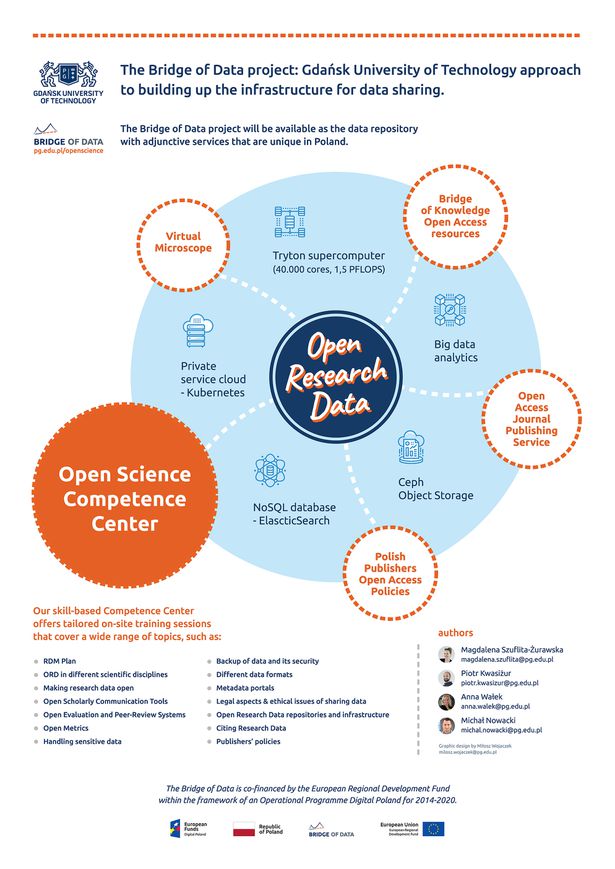
Magdalena Szuflita-Żurawska, Anna Wałek
Metadata approach in the Bridge of Data project at Gdansk University of Technology, , Gdansk University of Technology
EOSC-hub Week 2019
10-12 April 2019, Prague, Czech Republic
Summary: The Bridge of Data Project is an outgoing project at the Gdansk University of Technology (GUT) related to the open data curation and sharing. It is a continuum of the Bridge of Knowledge platform that was mainly focused on the institutional repository and scientific services for the academic community.
In this poster, we would like to present the process of our approach to metadata collection and description and show the challenges and difficulties in designing it. Selecting the standards that will be appropriate for datasets collections and fulfill the FAIR principles, is a weighty and difficult decision. For scientific publications, we already support Dublin Core and Highwire Press tags. Additionally, to ensure the project’s compatibility with 5 stars Open Data, each object is described by schema.org with JSON-LD formatting.
As metadata is essential for efficiently storing, sorting, retrieving, sharing and link scientific data, and to assure the description of granular levels of resources, we have decided to use the DDI (Data Documentation Initiative) standard for the first level of metadata. Due to the wide range of disciplines covered by our project (GUT in collaboration with Gdansk University and Gdansk Medical University) from humanities, social sciences, technical and engineering to medical science, we were looking for a standard that best reflects our needs and assumptions. DDI standard is quite general, flexible, and more accessible for all disciplines and broader communities in comparison to others. In addition, DDI is more interoperable than other standards that will result in better indexing provided datasets in various search engines and data hubs raising awareness of its presence and availability. The second level of metadata will be subject-specific and more constrained to assure scientific objects more findable and reusable. As one example, we will support INSPIRE standard for GIS data.
It has to be highlighted that our data repository will have a hierarchical structure that allows e.g. research teams to assign the specific collection of datasets to specific projects a then sub-collection to different research objects such as individual scholars, publications, software or images.
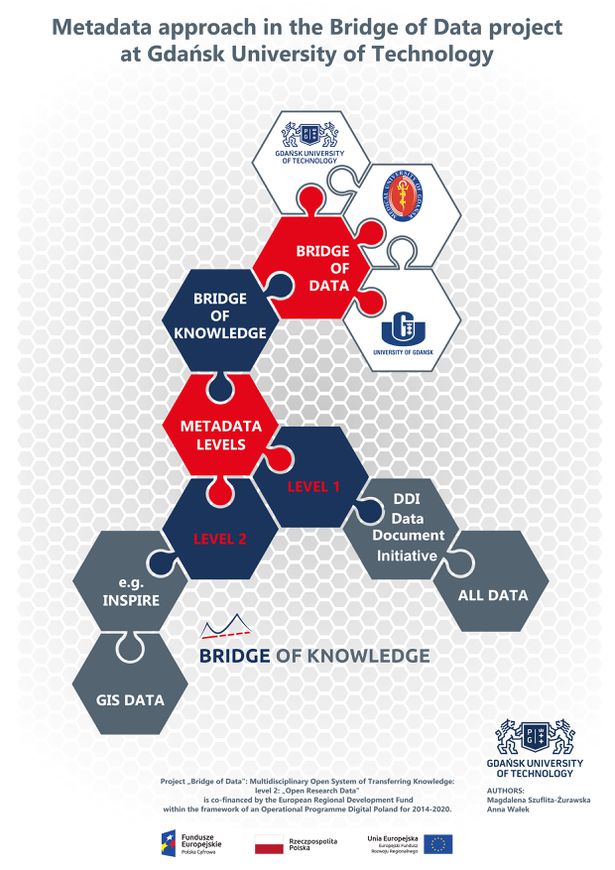
Magdalena Szuflita-Żurawska, Anna Wałek
Promoting Open Science through new The Bridge of Knowledge platform at Gdansk University of Technology
EUDAT Conference - Putting the EOSC vision into practice
22-25 January 2018, Porto, Portugal
Summary: The process of scholarly communications and adopting Open Science principles is changing dramatically. It has matured significantly by using a proper infrastructure for sharing and dissemination of scientific knowledge. Nowadays, creating awareness among academic community and offer solutions to specific issues are the most important goals for the Library. We would like to present challenges and strategies to promote scientific output of Gdansk University of Technology (GUT), Poland through new established platform “MOST Wiedzy”. MOST Wiedzy in Polish means The Bridge of Knowledge and stands as acronym of Multidisciplinary Open System Transferring Knowledge. It should be stressed that this project is co-financed by the European Regional Development Fund within the Optional Programme Digital Poland for the years 2014 – 2020. MOST Wiedzy project complements other features under the umbrella of Open Science platform. The platform is a solution that supports not only scholarly communication but try to facilitate the cooperation between university and business industry. The main goals include for example: integrating data from different databases and providers as well as establishing open repository. MOST Wiedzy is a modern platform that allows to present scientific profiles and research conducted at GUT. Through its website, users can search for publications, teaching activities or research equipment. MOST Wiedzy offers repository support from team of experienced librarians that not only upload the open access manuscripts but in addition, steer publications through different phases such as editing or promoting. In our poster, we would like to demonstrate how MOST Wiedzy project helps researcher to share their scientific results, gain recognition and promote their achievements.
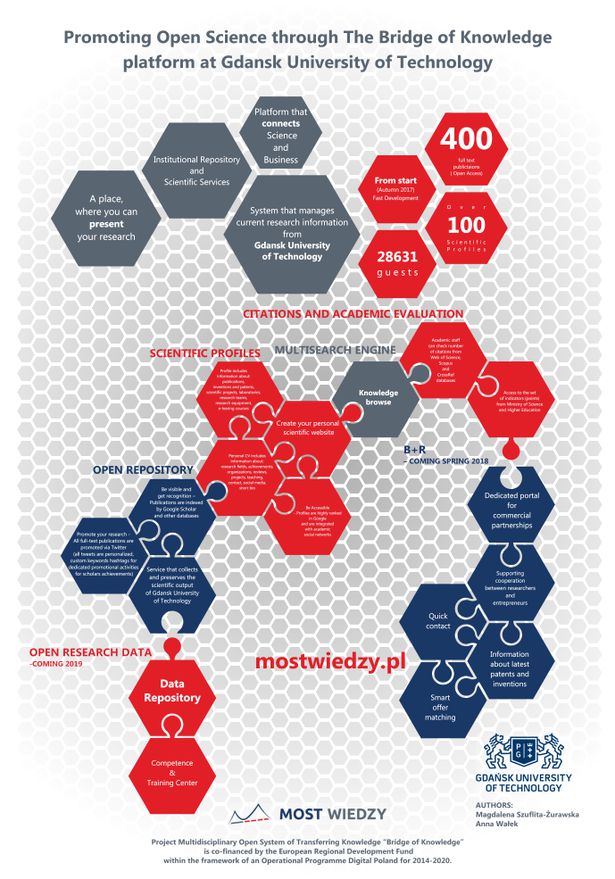
Magdalena Szuflita-Żurawska, Anna Wałek
Gdansk University of Technology Library as Regional Leader in creating Information Skills
IFLA World Library and Information Congress
83rd IFLA General Conference and Assembly
19–25 August 2017, Wrocław, Poland
Summary: The Polish higher education system is developing very dynamically. It is shaped by the international trends to construct a modern knowledge society with advanced information and technological skills. One of the essential directions is to turn into the Open Science that is strongly supported for example by European Commission.The role of the library in implementing and preparing trainings on information skills will be presented on the example of Gdansk University of Technology.
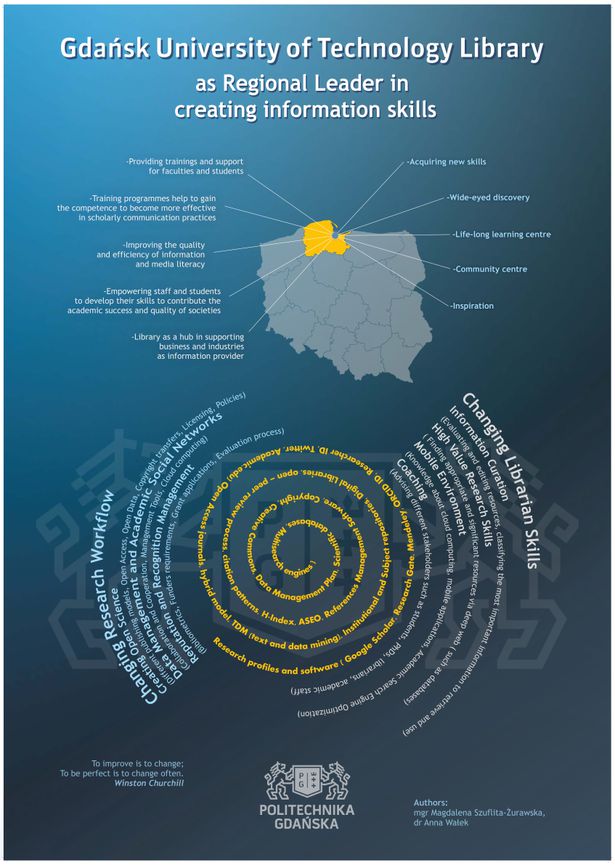
seen 13881 times
